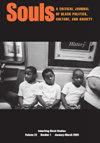“Sea of Fire”: A Buddhist Pedagogy of Dying and Black Encounters across Two Waves
IF 0.1
4区 哲学
Q4 ETHNIC STUDIES
引用次数: 1
Abstract
This article presents a preliminary sketch of a broader investigation into encounters between “engaged Buddhism” and Black liberation theology in the United States from 1965–1968, motivated by the eventual goal of articulating a different approach toward a politics of death, or what scholars now call “necropolitics,” at this interface. Focusing on a world-transformative dialogue between Thich Nhat Hanh and Martin Luther King, Jr., this study begins with Hanh's vindications of the practice of self-immolation during the imperialist wars in Viet Nam, as mediated through his pedagogy of “engaged Buddhism” and its epistemological and historical elaboration in the West. Decisive to King's momentous shift toward both anti-imperialist and anti-capitalist political commitments, formally enunciated in his 1967 speech “Beyond Vietnam,” I interrogate how this encounter develops and globalizes a distinctive epistemology of death, justice, and nonviolence—one that absolutely cannot be accessed without an avowal or faith in something beyond those ontologies assumed by the limits of modern secularism or any formation of civil society. Ultimately, my goal is to bring this earlier formulation to bear on contemporary discourses of bio- or necropolitics that predominantly revolve around either terroristic martyrdom or the limits of white ontology precipitating Black “social death.”“火之海”:一种跨越两波死亡与黑色相遇的佛教教育学
这篇文章初步概述了对1965年至1968年美国“参与佛教”和黑人解放神学之间遭遇的更广泛调查,其动机是在这个界面上阐明一种不同的死亡政治方法,或学者们现在所说的“死亡政治”。本研究聚焦于Thich Nhat Hanh和Martin Luther King之间的一场世界变革性对话,从Hanh对越南帝国主义战争期间自焚行为的辩护开始,通过他的“参与佛教”教育法及其在西方的认识论和历史阐述。金在1967年的演讲《超越越南》(Beyond Vietnam)中正式阐述了他向反帝国主义和反资本主义政治承诺的重大转变,我对这种遭遇是如何发展和全球化的,以及非暴力——如果没有对现代世俗主义或任何公民社会形式所假设的本体论之外的东西的公开声明或信仰,就绝对无法实现非暴力。最终,我的目标是将这种早期的表述与当代的生物或死亡政治话语相结合,这些话语主要围绕着恐怖殉难或白人本体论的局限性引发黑人的“社会死亡”
本文章由计算机程序翻译,如有差异,请以英文原文为准。
求助全文
约1分钟内获得全文
求助全文

 求助内容:
求助内容: 应助结果提醒方式:
应助结果提醒方式:


